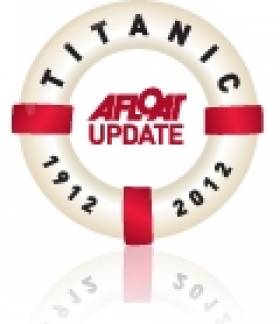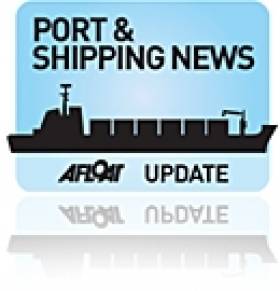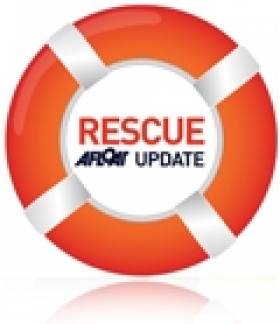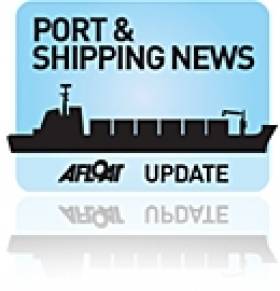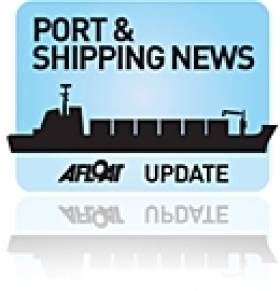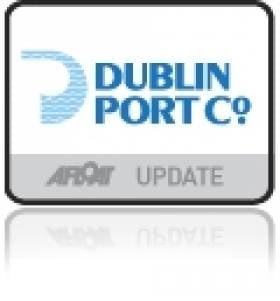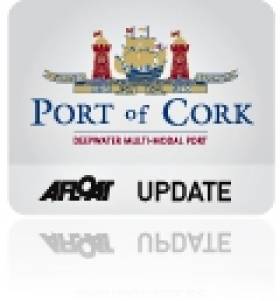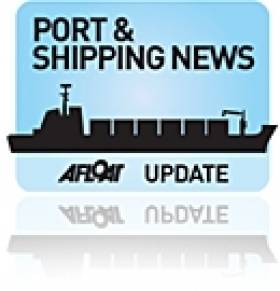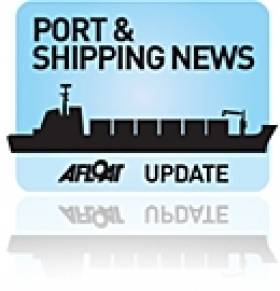Displaying items by tag: Shipping
The 13 Deadliest Shipwrecks in History
#TITANIC - Irreverent tech website Gizmodo has marked the 100th annversary of the sinking of the Titanic with a list of the 13 deadliest shipwrecks in history.
The list runs the gamut from well over a century ago, in the early days of passenger shipping - see the SS Sultana, a tragedy overshadowed by the assassination of Abraham Lincoln and the end of the American Civl War - to more recent events.
Included are such as sad tales as that of the Empress of Ireland, the worst disaster in Canadian maritime history in which more than 1,000 died, and much closer to home the Lusitania, which went down off Kinsale in May 1915 after a torpedo attack.
But the worst was arguably suffered by the passengers of the steamship SS Kiangya - which blew up 50 miles north of Shanghai in December 1948, taking as many as 3,920 lives - and the horror that befell the MV Doña Paz in the Philippines in December 1987, where estimates put the death toll at an unbelievable 4,000.
Gizmodo has more on the story HERE.
Irish Ferries Appoints Operations Director
Andrew Sheen has been appointed Operations Director, Irish Ferries.
A former engineer on the company's fast ferry Jonathan Swift, Mr. Sheen joined Irish Ferries from the UK's Maritime and Coastguard Agency having served as Technical Performance Manager, Engineer and Ship Surveyor.
A B.Eng (Hons), M.Sc and Chartered Engineer, he will be accountable for Irish Ferries' ships safety and operations, all port terminals within the company's network and costs associated with the company's operations in Ireland, Britain and France.
From Liverpool, he succeeds Mr. John Reilly who has retired from the company after many years of service.
Search Scaled Down for Missing Crewman in Irish Sea
#RESCUE - BBC News reports that the search for a cargo ship crewman missing in the Irish Sea has been scaled down.
The 22-year-old from Slovakia was reported missing yesterday morning from the Fehn Sirius, which was en route from Belfast to Portugal, as it headed past Arklow, Co Wicklow.
According to The Irish Times, he was last seen on the cargo ship around 10pm on Monday night as it headed south of the entrance to Strangford Lough.
Lifeboats from Portaferry and Newcastle in Northern Ireland and Arklow joined the search and rescue operation, which was assisted by the RAF helicopter based at Prestwick in Scotland and an Irish Coast Guard helicopter.
However, most rescue services have now been stood down as the Fehn Sirius continues to backtrack in the Irish Sea, with assistance from the Naval Service vessel LE Ciara.
Only three days ago the body of another mariner was recovered from the Irish Sea off the north Dublin coast, more than a month after he went missing.
Schools Urged to 'Follow the Fleet'
#SHIPPING – The Irish Maritime Development Office (IMDO) has announced the 2012 Schools essay competition for the www.followthefleet.ie educational programme.
The IMDO reintroduced the Follow the Fleet education programme to Irish schools and classrooms in 2006 as an online teaching resource that brings the world of maritime trade and adventure alive for school children between the ages of 7 to 12. Since its launch in 2006, Follow the Fleet has recruited over 800 national schools with an estimated outreach to 28,000 primary school children registered to take part in the education programme.
This year the annual schools competition is sponsored by Irish Ferries and is also supported by Ardmore Shipping, BMCI Insurance & Investments and the Port of Cork. The competition will be centred around three key themes, maritime technology, trade, and heritage, all of which are interlinked with the lessons and Captain's logs published on the website.
Speaking of their involvement with the annual competition, Irish Ferries commented : 'Follow the Fleet' is a concept that has echoes of earlier days when school children would trace the routes followed by the great Irish merchant vessels of yesteryear as they ploughed the oceans carrying bulk cargoes that would service the needs of communities around the world. As Ireland's premier passenger and freight ferry company, Irish Ferries is proud to see that concept revived and to sponsor the Follow the Fleet Competition, thereby helping to foster in our young people a wider understanding of the shipping industry and its contribution to tourism, employment and the economy".
The 2012 Follow the Fleet Competition is offering some amazing prizes for the winning entries which will be judged by a panel headed by noted maritime journalist and Afloat associate editor Tom McSweeney. Some of the prizes include a trip to the National Maritime College in Cork for the winning class where they will be able to command their own ship at sea in the world class ship simulators. The Overall School Winner Category will also win a laptop for their teacher and the category winners will see their essay scripted into a short animated film, voiced by actor Aidan Dooley of 'Tom Crean –Antarctic Explorer' fame.
The competition is open to all primary school classes registered on the www.followthefleet.ie programme, the deadline for the competition is the 5th of April 2012. All details of the competition and entry forms are available on-line on http://www.imdo.ie/followthefleet/news.asp
For more details contact [email protected] or call the IMDO on 01 476 6500 for more information on joining the Follow the Fleet programme.
Ship Owner Fined for Overloading
#SHIPPING – At a hearing yesterday at Southampton Magistrates Court the German owners of the Antigua and Barbuda registered cargo vessel 'Katja' pleaded guilty to the overloading of their vessel which had arrived in Liverpool laden with rock salt from the St. Lawrence Seaway, Canada in November 2010.
The vessel was loaded to its marks with rock salt and sailed from Goderich to arrive at the Manchester Ship Canal on the 23rd November 2010. Rock salt was in high demand to treat UK highways at this time.
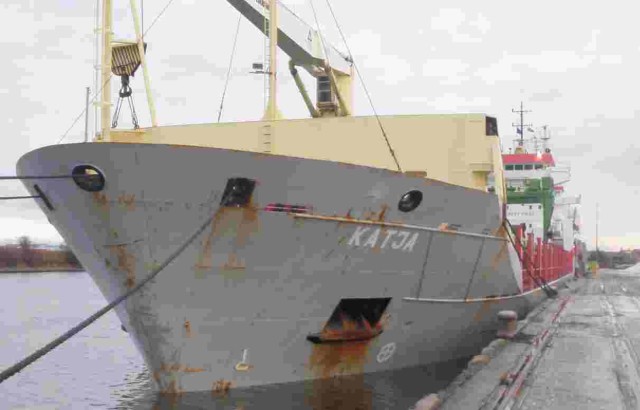
The 'Katja' - Photo: courtesy of Maritime and Coastguard Agency
As the vessel entered the River Mersey, the pilot on another passing vessel noticed that the Plimsoll Line and load lines were not visible and the vessel appeared very low in the water. When the vessel arrived in the Queen Elizabeth II Dock it was inspected by MCA Port State Control Officers who found that the load line that marks the safety limit of the vessel was submerged by 39.5 cm.
Katja Schiffahrtsges Gmbh of Haren, Ems, Germany, owner of the ship Katja, was fined £28015 plus costs of £5000 awarded to the MCA.
In summing up the Magistrates stated "We share the Maritime and Coastguard Agency's view of the seriousness of the case, however accept that the overloading was not for gain. We have also considered the early plea of guilty and have reduced the fine of £42000 accordingly.
Simon Milne, from the Maritime and Coastguard Agency said:
"Since the good work of Samuel Plimsoll, the application and enforcement of load line marks have prevented the loss of many vessels and have saved the lives of many seafarers.
Dublin Port Ferry Passenger Numbers fell by 5.6% to 1.7m
#PORTS – Dublin Port Company today published trade statistics for 2011. Total throughput in 2011 was broadly in line with 2010, down by only 0.1% to 28.1m tonnes. Within this, however, exports continued to grow and were up 2.8% in the year at 11.5m tonnes.
2011 trade statistics summary:
Total throughput – 28.1m tonnes, down 0.1%
Exports – 11.5m tonnes up 2.8%
Imports – 16.6m tonnes down 2.0%
Bulk Liquid – 3.6m tonnes, down 4.7%
Bulk Solid – 1.6m tonnes, up 10.8%
Unitised trade now accounts for 81% of Dublin Port's business. During 2011, Ro-Ro freight volumes were virtually unchanged at 725,000 units. In contrast, Lo-Lo volumes fell by 5.1% to 526,000 TEU.
Ferry passenger numbers fell by 5.6% to 1.7m. This follows a record year in 2010 when numbers were boosted by the impact of weather and ash clouds. Compared to 2009, passenger numbers were up 11.1%.
With 1.7m ferry passengers moving through the port, Dublin Port is behind only Dublin Airport and Cork Airport as a national tourism gateway.
The cruise liner side of Dublin Port's business saw a 7.5% increase in cruise passengers. During 2011, 87 cruise ships brought over 135,000 passengers and crew to Dublin.
Commenting on the trade figures, Eamonn O'Reilly, Dublin Port Company's Chief Executive said:
"Trade levels at Dublin Port were steady in 2011 which is a robust performance given the large (6.1%) increase in the port's volumes in the previous year.
"Whereas export volumes have continued to grow and are now 0.5m tonnes higher than they were in 2007, the poor performance of the domestic economy has resulted in a continued decline in imports. These are now 3.4m tonnes lower than they were in 2007.
"Notwithstanding the poor performance of the economy we are continuing to plan for the future and will shortly be launching our Masterplan 2012 to 2040. Dublin remains the largest and most important port on the island and our Masterplan is intended to ensure we continue to provide vital port capacity particularly as the economy returns to growth in coming years.
"With all the difficulties in the economy we are still only 9% behind where we were at the peak in 2007 and we believe that any pick-up in domestic demand will quickly translate into growth in import volumes. The Masterplan will ensure we stay ahead of future growth in demand for decades to come".
Minister Launches Consultation on Harnessing Ireland's Ocean Wealth
#NEWS UPDATE - Minister for the Marine Simon Coveney has launched a public consultation process on harnessing the potential of Ireland's vast marine resources.
Our Ocean Wealth is calling for input into how Ireland can best capitalise on the trillion-euro global market for marine products and services, from seafood and tourism to shipping, oil and gas, renewable ocean energy and marine science.
Launching the consultation, Minister Coveney said: "We need to change the way we in Ireland think about the sea and look for new opportunities to harness the potential of our 220-million-acre marine resource.
"This government is determined to generate the momentum to drive forward a new era of sustainable economic development across the maritime sectors - we must avail of these opportunities to assist in our recovery. We want your help to shape our plan, to shape our future and to assist in our drive towards our nation's economic recovery."
The consultation process is a step towards developing an Integrated Marine Plan for Ireland intended to grow the percentage of GDP generated by the country's marine resource, which covers an area 10 times the size of Ireland's land mass.
The minister added: "We need an Integrated Marine Plan to harness our ocean wealth, get the environment right for investment and use the potential of our marine economy to create jobs in a sustainable manner."
The consultation phase will be open until 31 March with an aim to publish the Integrated Marine Plan during the summer. For more details visit www.ouroceanwealth.ie.
Port of Cork Gets off to a Good Start in 2012
#CORK – January 2012 kicked off to a good start for the Port of Cork with over 76,000 tons of dry bulk animal feeds unloaded in one week, a record for the Port. The high quantity of feed which was unloaded as part cargo from five large bulk carriers, gives a welcome boost to the quantities of dry bulk material handled by the Port of Cork.
In the Republic of Ireland bulk cargoes have seen an increase of 2% across all ports and this growth is a reflection of the growing confidence in the agricultural sector.
Commercial Manager, Captain Michael McCarthy said: "Unloading over 76,000tonnes of dry bulk animal feeds at Ringaskiddy Deep-water Terminal in five days is an excellent boost for the port. It demonstrates the port's capabilities when it comes to handling large ships with efficient and safe turnaround times. Many of the main feed importers are utilising the Port of Cork's deep-water capacity with Panamax vessels arriving fully laden to lighten before proceeding to other Irish or UK Ports"
New Zealand Cargo Ship Wreck Breaks Up in Heavy Seas
#SHIPPING - The Greek-owned cargo ship which ran aground off New Zealand three months ago - described as the country's worst maritime disaster - has split in two in heavy seas.
In a scene thankfully avoided closer to home, with the successful tranfer of 54,000 tonnes of vacuum gas oil from the damaged tanker Germar Companion in Belfast Lough, rough conditions off the New Zealand coast have caused the stern section of the Rena to snap off.
As many as 300 containers were washed overboard, polluting the water with milk powder and other debris, and fears are growing of a new oil spill in the coming days posing a threat to marine wildlife.
According to BBC News, hundreds of tonnes of fuel have spilled into the sea since the ship first ran aground at the Atrolabe Reef off North Island on 5 October, causing the deaths of hundreds of seabirds.
Though more than 1,100 tonnes of oil have been removed from the stricken vessel, some 385 tonnes remain aboard.
BBC News has more on the story HERE.
Successful Transfer of Cargo Completed
#SHIPPING – The successful transfer of 54,305 tonnes of vacuum gas oil from the vessel Genmar Companion to the BW Seine in Belfast Lough is now complete.
The Genmar Companion had been sheltering off the Copeland Islands since reporting a crack on its deck on 16 December. In order for repairs to take place in Belfast Harbour it was necessary to remove the cargo of oil in Belfast Lough by ship to ship transfer; due to there being no shore reception facilities in Belfast Harbour for a tanker of this size. The operation to transfer the vacuum gas oil was delayed several times due to the extreme weather, but was able to commence yesterday (Friday 6 January).
Hugh Shaw, The Secretary of State's Representative (SOSREP) Maritime Salvage and Intervention, said:
"I am delighted that the ship to ship transfer operation has now been successfully completed, the exclusion zone that was in place will be removed at midnight tonight. I would like to take this opportunity to offer my thanks to all concerned with the operation. In particular I would like to thank Fendercare and the masters and crew of both the Genmar Companion and BW Seine for their professionalism in carrying out the transfer in extremely difficult weather conditions experienced over the past week. In addition the operation could not have taken place without the support of the ship owners/operators, Belfast Harbour, Svitzer Towage and the Maritime and Coastguard Agency.
Finally, I would like to thank the Northern Ireland Environment Agency and Northern Ireland Assembly for supporting the decision to carry out the operation in Belfast Lough, which prevented any further risk to the Genmar Companion or the environment had it been necessary for the damaged ship to seek an alternative place of refuge in less sheltered waters."
Alex Attwood, Northern Ireland Environment Minister, said:
'I think we are all relieved that the operation has now been concluded successfully and that there has been no damage to the Northern Ireland coastline, one of our most beautiful assets. There have been considerable challenges in managing an operation of this nature during the stormy conditions we have been having. I would like to thank the Captains and crew of both vessels who worked throughout the night to achieve a successful outcome. I would also like to commend the Secretary of State's Representative, Hugh Shaw, for his thoroughness and patience in handling this incident. At all stages he has kept both me and my staff fully appraised of the developments in our combined efforts to ensure that our marine environment was protected. Most importantly, I am delighted that the environmental sensitivities were recognised and took precedence over commercial considerations throughout the incident."



























